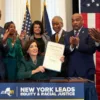Stay up-to-date with free briefings on topics that matter to all Californians. Subscribe to CalMatters today for nonprofit news in your inbox.
Years of effort went into making California the first state in the nation to get reparations laws to the governor’s desk to be signed into law. But now, in the final hours, two historic bills aimed at repairing harm for Black Californians — those that are specifically written for the African American descendants of people enslaved in the United States – are stalling in the Assembly.
In January the Legislature’s Black Caucus introduced a slate of 14 reparations bills, but Sen. Steven Bradford, a member of the caucus and a state reparations task force, also introduced his own more ambitious bills.
Bradford’s Senate Bills 1403 and 1331 would create a new agency and also a fund to help implement those policies recommended last year by a first-in-the-nation state task force, including eventual direct cash payments to the African American descendants of people enslaved in the United States. The envisioned California American Freedmen Affairs Agency would help Black Californians research their genealogy, confirm their eligibility for reparations payments, and expedite their claims.
But last week, Gov. Gavin Newsom’s administration tried without success to change Bradford’s bill so that instead of creating the new state agency to move on reparations, it would instead authorize California State University to “study” the issue further and recommend a process for determining a person’s eligibility for reparations payments. That didn’t set well with Bradford and advocates of his more aggressive approach, who contend the state has already spent four long years studying reparations.
Newsom’s office declined to comment, saying he typically does not speak about pending legislation. The California governor, who has cultivated his image on a national stage, met the historic task force’s report with what many felt was a lukewarm reception, commenting that reparations were about “much more than cash payments.”
Task force members and lawmakers have long known that passing reparations measures — especially those aimed at making cash payments to atone for slavery’s legacy — would be a tough political sell. Many did not expect some proposals to come as far as they did given that the state whip-sawed from a record surplus to a massive deficit this year. amid California’s budget shortfall. Nor do polls suggest a majority of Californians are supporting: a September poll of 6,000 registered voters from UC Berkeley’s Institute of Governmental Studies found that only 23% supported cash reparations compared to 59% who opposed them.
Bradford, a Democrat from Inglewood, said late Friday he heard his bills would not be called up for a vote.
Assemblymember Lori Wilson, a Democrat from Suisun City and chair of the Black Caucus, told the Sacramento Bee on Thursday evening that lawmakers were still trying to confirm whether they had enough votes for Bradford’s measures.
Bradford disputed that.
“We have the votes. But if they’re saying we don’t have the votes, then there must be somebody over there (in the Assembly) working against the bill,” he said Friday afternoon.
The deadline to pass the bills during this legislative session is midnight tonight.
“It’s been expressed there’s some concern about finance ..” Bradford acknowledged. “Every bill runs the threat of a veto but that doesn’t stop you from doing your work, so I think we still have an obligation to the people of California who are depending on this bill, excited about it, to help have it move forward and let its fate be determined once it gets to the governor’s desk.”
Some reparations advocates are outraged, with several dozen saying they were heading to the Capitol today for the final countdown.
“Call his feet to the fire and make him veto it,” said Jonathan Burgess, a fire battalion chief from Sacramento and well-known advocate for reparations, referring to Newsom. “Show us who you are is what I’m asking.”
Burgess noted that the other reparations measures passed by the Black Caucus could benefit all Californians and are not explicitly aimed at those harmed by slavery. One of Bradford’s bills that did make it to the governor’s desk would establish a means of restoring property seized in race-based uses of eminent domain.
Advocates also discussed the need to maintain momentum for reparations measures as public enthusiasm for racial justice wanes.
In 2020, the Minneapolis police murder of George Floyd set off a nationwide racial reckoning. In its wake, California’s Secretary of State Shirley Weber, then an assemblywoman, championed a bill establishing the California Reparations Task Force, which Newsom signed into law. The task force traveled the state for two years, conducting hundreds of hours of public hearings and listening to residents and researchers. It released a more than 1,000-page report with its findings and more than 100 recommendations.


